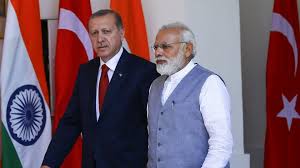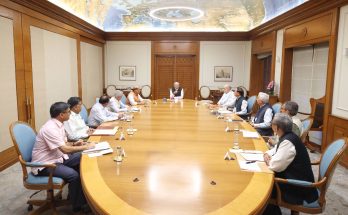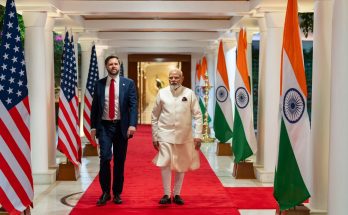
India and Turkey, the two G20 economies, have raised the bar for their economic partnership and agreed to intensify their counter-terror cooperation despite differences over issues like the Kashmir dispute.
As Turkish President Recep Tayyip Erdogan wrapped up his two-day visit to India on May 1, there was a clear-cut resolve to build on convergences, especially in the economic arena, and find ways to bridge differences through sustained dialogue.
Mr Erdogan held talks with Prime Minister Narendra Modi under the shadow of discords in the political relationship between the two countries when the Indian media splashed remarks by the Turkish leader in an interview to a TV channel in which he favoured a multilateral dialogue on the Kashmir issue that went against New Delhi’s consistent stand that the issue can only be resolved bilaterally with Islamabad. In response, India conveyed to Turkey that it is ready to resolve all bilateral issues with Pakistan, including Kashmir, said India’s Ministryof External Affairs spokesman Gopal Bagley when asked to comment on Mr Erdogan’s suggestion of a multilateral dialogue. The spokesperson added that India conveyed its position on Kashmir and stressed that it is essentially a terrorism issue.
Joint fight against terror
However, when Mr Modi and Mr Erdogan appeared before the media after their talks and addressed the entrepreneurs of India and Turkey, they talked about threats from terrorism, the need for the world to come together to uproot terror and agreed to work on substantially increase the bilateral economic engagement through foreign direct investment and technology tie-ups. The two also discussed cooperation on global issues like expediting the UN reforms.
The two leaders held extensive talks on the issue terror, after which Mr Modi told a joint media interaction with Mr Erdogan that the two countries have agreed to work together bilaterally and multilaterally to effectively counter terror.
“We live in times where our societies face new threats and challenges every day. In particular, the constantly evolving threat from terrorism is our shared worry. I held an extensive conversation with the President on this subject. We agreed that no intent or goal no reason or rationale can validate terrorism,” said Mr Modi.
“The nations of the world, therefore, need to work as one to disrupt the terrorist networks and their financing and put a stop to cross border movement of terrorists,” said Mr Modi.
“They also need to stand and act against those that conceive and create, support and sustain, shelter and spread these instruments and ideologies of violence,” said the Indian leader, in a veiled reference to Pakistan-origin terror directed against India. The Turkish President said that his country “will always be by the side of India in full solidarity while battling terrorism.”
Setting $10 billion trade target
On the economic cooperation front, Mr Modi said he highlighted the transformative changes underway in India that are making the investment climate more open and facilitating ease of doing business. Mr Bagley said that Turkey has taken a keen interest in Indian government’s flagship programmes like smart cities project and Make-in-India manufacturing scheme.
Mr Modi said both countries are large economies and that the strength of the economies present numerous opportunities to expand trade. “I encourage stronger partnership of Turkish companies with the government’s flagship programmes,” he added. The Turkish president said his country considered India as a strategic partner because of its location, resources and its economy.
Bilateral trade is hovering around $6.5 billion. Raising the bar, Mr Modi said that there was a need to increase it to at least $10 billion as soon as possible. He said that the countries will look at ways to expand cooperation in the energy and infrastructure sectors. The Indian leader singled out energy as a key component of India-Turkey ties as both the countries are energy deficient and their energy needs are ever-increasing.
Turkey is keen to invest in India’s burgeoning real estate industry in which Turkish companies are regarded among the best in the world. Mr Modi, therefore, invited Turkey’s construction companies to India holding out the prospects of a huge opportunity as India plan to build 50 million houses in the next five years and for this purpose Indian government fine-tuned its FDI policy in construction sector.
In this context, he also mentioned India’s ambitious plans for metro rail projects in 50 cities and high speed trains in various national corridors. He also invited Turkish businesses to invest in sectors like energy, rail, road and ports saying India was never a better investment destination than it is now. Mr Erdogan went a step further and suggested that India and Turkey initiate free trade agreement talks and look for possibility of bilateral trade in domestic currencies to tide over the issue of exchange rate volatility. The businessmen of the two countries, he said, could also join hands to explore investment opportunities in third countries.
Author Profile
- India Writes Network (www.indiawrites.org) is an emerging think tank and a media-publishing company focused on international affairs & the India Story. Centre for Global India Insights is the research arm of India Writes Network. To subscribe to India and the World, write to editor@indiawrites.org. A venture of TGII Media Private Limited, a leading media, publishing and consultancy company, IWN has carved a niche for balanced and exhaustive reporting and analysis of international affairs. Eminent personalities, politicians, diplomats, authors, strategy gurus and news-makers have contributed to India Writes Network, as also “India and the World,” a magazine focused on global affairs.
Latest entries
 India and the WorldApril 23, 2025Kashmir terror: India hits back at Pakistan, highlights cross-border linkages
India and the WorldApril 23, 2025Kashmir terror: India hits back at Pakistan, highlights cross-border linkages India and the WorldApril 23, 2025The Century of America and India: Growing Together
India and the WorldApril 23, 2025The Century of America and India: Growing Together In ConversationApril 20, 2025India Can Contribute Largely to Development of Morocco’s Defence Industry: Ambassador
In ConversationApril 20, 2025India Can Contribute Largely to Development of Morocco’s Defence Industry: Ambassador India and the WorldApril 2, 2025Mapping Next Steps for BIMSTEC
India and the WorldApril 2, 2025Mapping Next Steps for BIMSTEC







